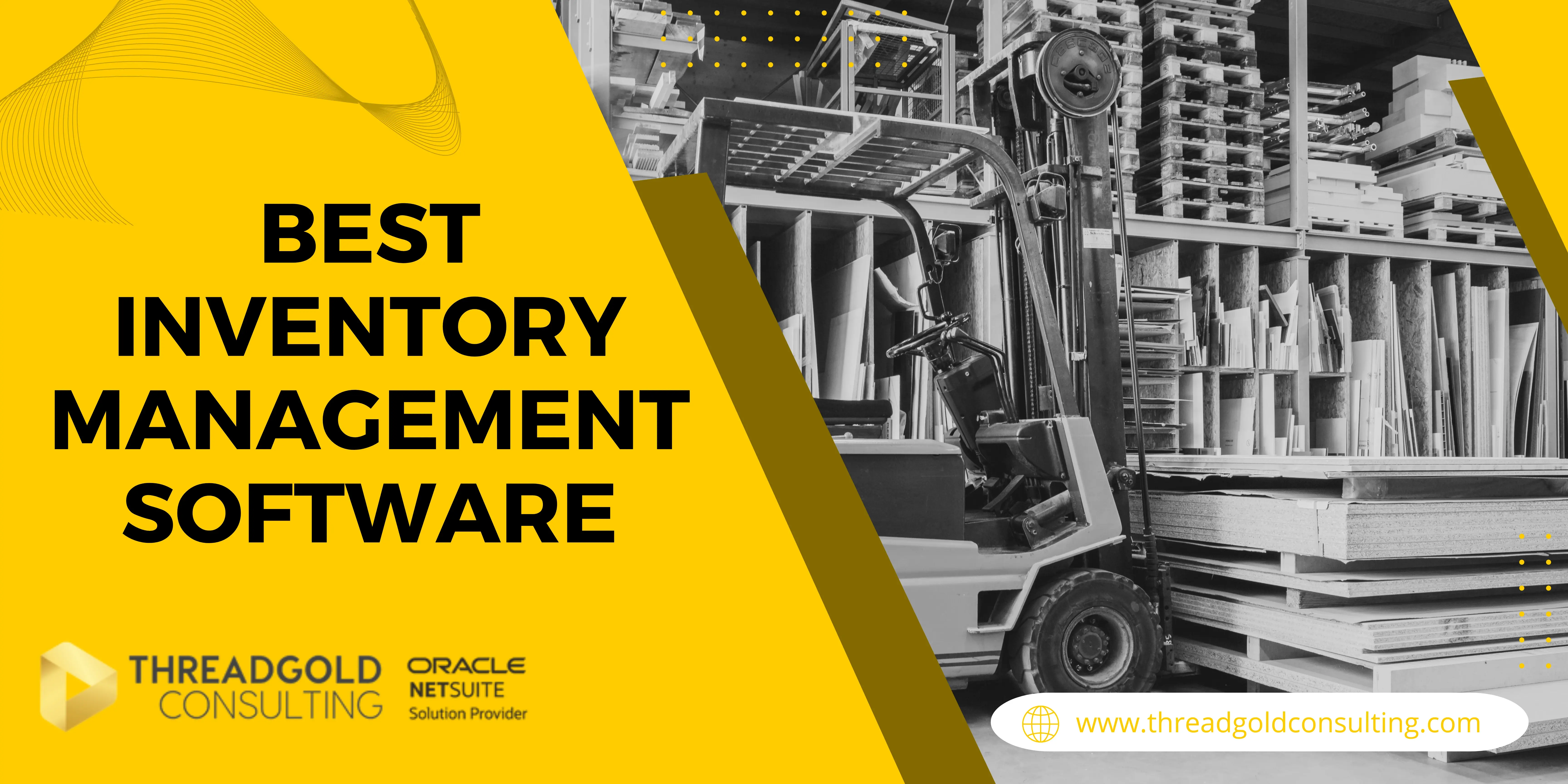Choosing the right ERP solution can be a daunting task, given the abundance of options and vendors available. The specific requirements of a company may vary, with some requiring more flexibility or scalability, or even special features. Regardless of the size of your company, whether it's a single factory or a multinational corporation with multiple locations, there's an ERP solution that's a perfect fit.
To make the selection process easier, we've curated a list of the top ERP solutions in Singapore and highlighted what sets each one apart.
1. Oracle NetSuite
Oracle NetSuite has been actively expanding its presence in Singapore, as the country is a strategic hub for businesses in the Asia-Pacific region. NetSuite is a comprehensive ERP system that includes advanced financials, CRM, project management, E-commerce, supply chain management and more.
NetSuite has evolved to become one of the best ERPs on the market, due to it's cloud-based, modular system that supports organisations as they grow. NetSuite is highly customisable, allowing businesses to execute complex integrations, and allowing them to seamlessly add modules, entities and users as needed.
It provides extensive reporting and business insights, providing a single source of truth and allowing organisations to make timely decisions. It is one of the higher end ERPs on the market, but it's much easier to implement than other solutions, and this brings the costs down significantly.
NetSuite has tailored its offerings to cater to the Singapore market, including a dedicated Singapore data centre, local compliance support, multi-language offering and a strong ecosystem of partners that have a deep understanding of the local market.
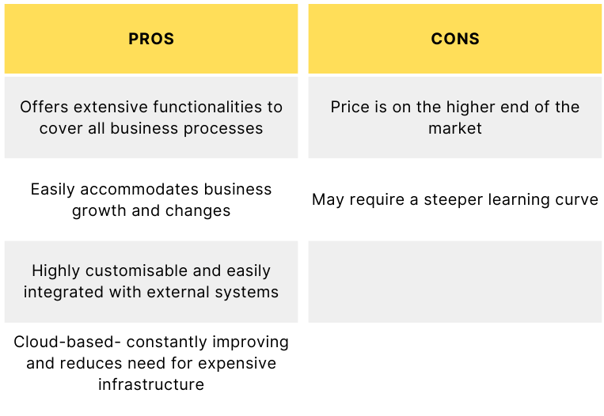
For more information on Oracle NetSuite and it's costs, check out our comprehensive NetSuite pricing guide. Or, if you'd like a personalised quote, use our NetSuite pricing calculator below.
2. SAP
SAP is a global leader in ERP solutions, and is another great choice for businesses in Singapore. SAP offers a suite of integrated business applications that help organisations manage their business processes and operations efficiently.
SAP offer a number of different ERP solutions, including SAP Business One, SAP Business by Design & SAP S/4 HANA. SAP Business One is an on-premise solution tailored for small to medium-sized enterprises, offering customisation options and flexibility in deployment, making it suitable for businesses with simpler processes who want to manage their own hardware.
SAP Business ByDesign and SAP S/4 HANA target mid to large sized enterprises, providing a comprehensive, cloud-based, and fully integrated suite of modules for more complex operations. With a strong presence in the region, SAP offers tailored solutions and services to meet the unique requirements of Singapore-based businesses across various industries. Like NetSuite, SAP has a dedicated data centre, multi-language capabilities, and functionality to ensure business are inline with local compliance and regulations.
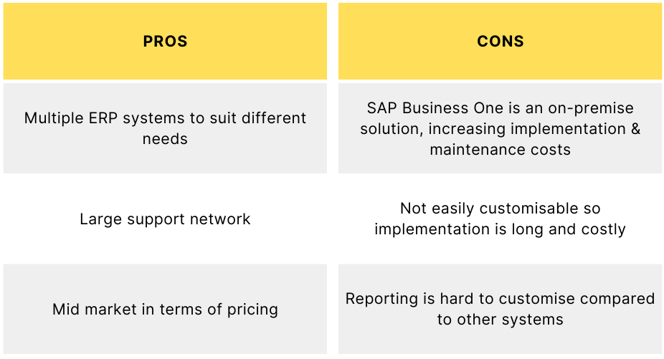
3. Microsoft Dynamics Business Central
Microsoft Dynamics Business Central is a comprehensive ERP solution that caters to a wide range of industries, including manufacturing, distribution, retail, and professional services. It is highly customisable and provides seamless integration with other Microsoft products such as Dynamics CRM, Power BI, Microsoft Flow and more. As such, this could be a good fit for companies already using a lot of Microsoft products.
It also integrates well with third party applications, and comes at an affordable price point. Although Dynamics is designed for the cloud, it can also be deployed on premise, making it suitable for businesses that want that extra level of data security.
One of the key drawbacks of Microsoft Dynamics is it's limited reporting capabilities. There are very few filtering options, and you cannot drill down into specific transactions, making it hard to analyse your data. As such, reporting requires extra customisations from your implementation partner, and this can add to costs. Similarly, Microsoft Dynamics cannot easily handle multi-entity operations, as it lacks intuitive financial consolidation capabilities. Again, this would require extensive customisations, adding to implementation and ongoing costs.
Due to it's affordable price point but lack of functionality, this product is better suited to smaller organisations that operate in one entity and don't require extensive customisations or reporting.
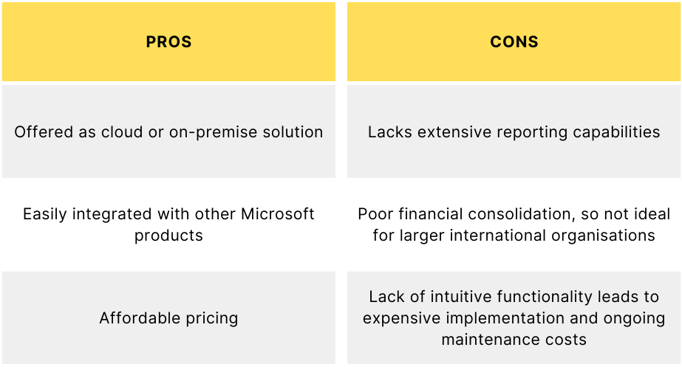
4. Sage Intacct
Sage Intacct is another top ERP on the market, and a good choice for Singaporean businesses looking for a comprehensive financials software. Sage Intacct is a cloud-based financial management and accounting software tailored for small to medium-sized businesses. It offers a range of features including core financials, advanced functionalities like multi-entity management, real-time reporting, and custom dashboards, along with robust compliance and security measures.
Sage Intacct is great for financials, but lacks comprehensive ERP functionality. It does not offer native CRM, E-commerce, supply chain management, project management functionality etc, so this would need to be integrated. This requirement for several third-party integrations can make implementation costly and can slow down the system.
Sage Intacct comes at an affordable price, so would be an ideal fit for small to mid sized Singaporean businesses that do not require extensive functionality from their ERP system.
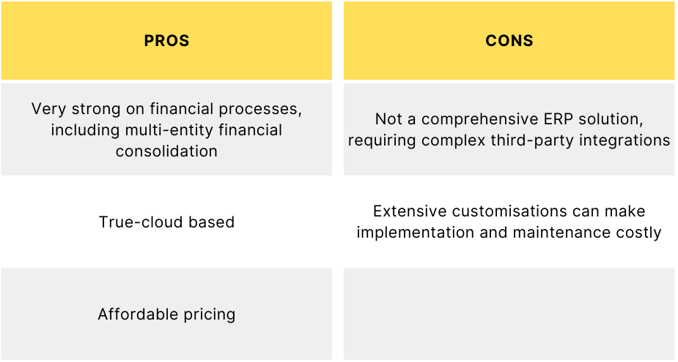
5. Workday
Workday ERP, established in 2006, has gained popularity in Singapore, particularly among businesses that value its strong focus on human resources and financial management. Initially designed to support HR, Workday has expanded its capabilities to cover various ERP functionalities such as forecasting, inventory management, financials, supply planning, automation, project management, and business intelligence. It offers integrations with over 600 external applications, so can be tailored to create the ideal system.
Workday comes at a higher end price point, so is more suited to mid to large sized companies. Workday also comes with a few limitations, mainly it's need for extensive customisation and it's lack of functionality to support manufacturing operations. 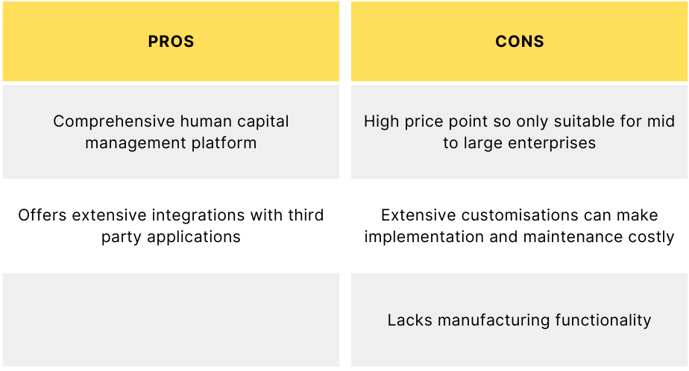
6. IFS
IFS ERP is a versatile and comprehensive solution that is more tailored to organisations in the manufacturing industry, due to its comprehensive manufacturing functionality. It has been gaining traction in various industries in Singapore, including aerospace, defense, utilities and energy, telecommunications, and engineering. This European-based ERP software is designed to support large, complex organizations with a strong focus on Field Service Management and Enterprise Asset Management.
IFS ERP is easily scalable, allowing Singapore businesses to grow and adapt their ERP solution as their needs evolve. However, users have often cited a lack of training support and an unintuitive interface as key drawbacks of the system. IFS also lacks the same Singapore based partner ecosystem that other more popular ERPs have, so finding a reputable partner to carry out the implementation may be a challenge.
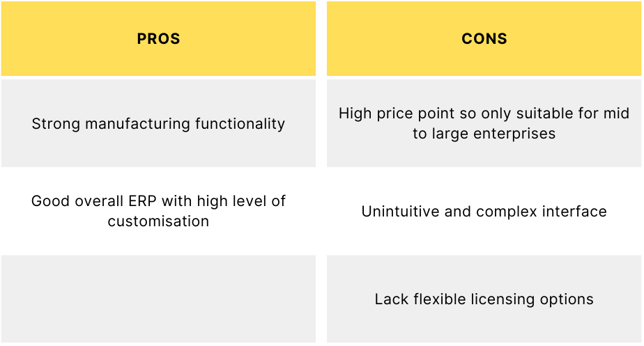
7. Infor CloudSuite
Infor CloudSuite offers a comprehensive and industry-focused ERP solution that addresses the unique needs of various industries, making it an attractive option for businesses in Singapore. It's functionality includes financials, CRM, project management, supply chain management and planning and scheduling.
CloudSuite is reliable and scalable and works well in the hospitality, aerospace, automotive, healthcare, and public sectors. It has 6 options to choose from, providing the flexibility required to adapt to the ever-changing business environment in Singapore.
However, one of the key drawbacks of Infor Cloudsuite is that updates need to be performed by a trusted partner, meaning each customer can be on different versions. This lack of automatic updates can increase costs significantly, and increase the chance of errors and system downtime. The system also lacks certain important features such as customisable reports and revenue recognition, which are essential for certain businesses.
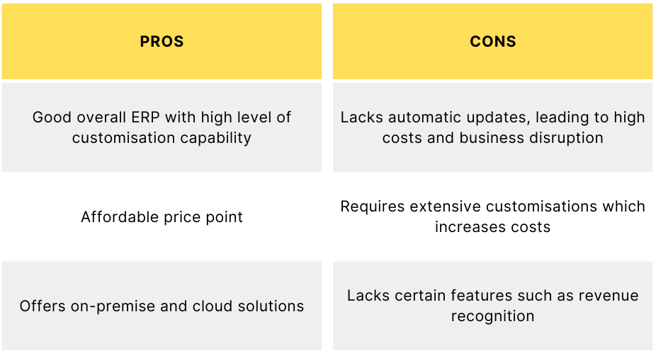
8. Epicor
Epicor offers a wide range of features and benefits tailored to the diverse business landscape in Singapore. The software's flexibility, scalability, and industry-specific solutions make it an attractive option for businesses in various sectors, such as manufacturing, distribution, retail, and service industries.
Epicor offers robust financial management, supply chain management, production, and CRM modules to help businesses streamline their operations and improve efficiency. The availability of multiple deployment options, including cloud, on-premises, or a hybrid approach, offers Singaporean businesses the flexibility to choose the right model for their specific needs and preferences. Epicor also offers extensive customisations, is available in a multitude of languages, and offers robust reporting capabilities.
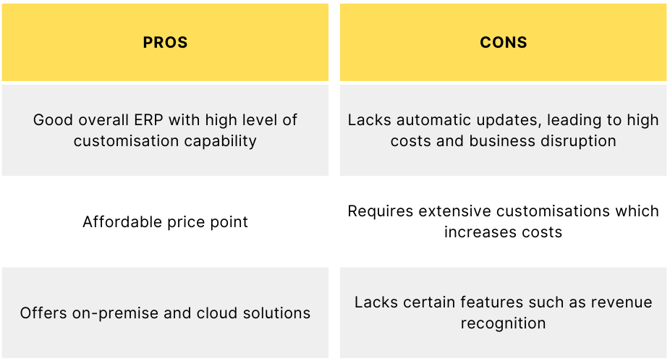 9. Odoo
9. Odoo
Odoo is an open-source ERP software offering a comprehensive suite of business applications. For most ERPs, you are given a set of standard modules that you can't edit, but can build customisations to support these modules. Whereas with open source, you can completely edit the base modules, making it easier to customise the system to fit your organisation's needs.
Odoo comes with all the standard base modules, including accounting, CRM, warehouse management, inventory, project management, and more. Odoo comes at a very cheap price point, and they even offer a free plan for businesses that only require one app from their database.
The system also has a strong community network of developers and users, in which they can ask questions and share tips. Odoo would be a good choice for small to mid sized Singaporean businesses that have the expertise to develop their own systems, and do not require too many complex integrations.
The downsides of Odoo come with the need for experienced internal developers to create the customised system, and the high level of customisation can make it hard to use and understand the completed system.
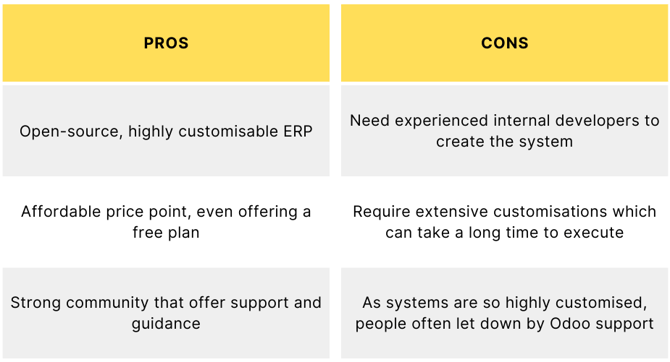
10. Deskera
Finally, Deskera ERP is another great options for Singapore businesses, due to it's strong presence within the region. Deskera is an integrated business management software designed for small to medium-sized businesses, offering a comprehensive suite of applications to streamline core business processes. It encompasses modules for financial management, inventory management, CRM, manufacturing, and HR management.
Deskera's is known for its user-friendly interface and cloud-based system, which allows for real-time access to business data and analytics. Its mobile app enhances accessibility, enabling users to manage business operations on the go. Additionally, it provides robust reporting tools, dashboards, and analytics to help businesses make informed decisions.
Deskera may not be the best choice for companies that require a best of breed ERP with extensive integration and customisation capabilities.
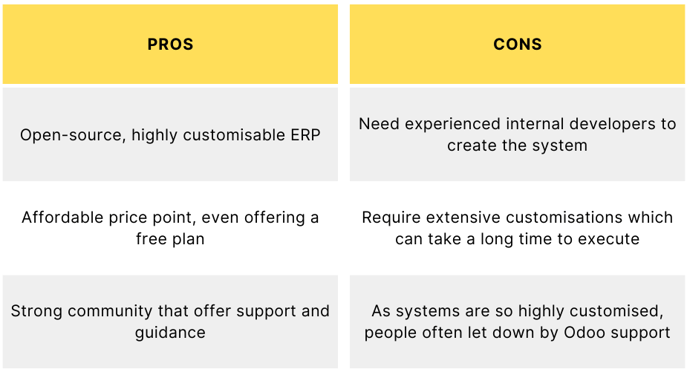
Factors to consider when evaluating your ERP
When evaluating ERP softwares, you must consider many factors. Some things to keep in mind are:
Timing - If you are considering switching ERP systems, give yourself plenty of time to prepare. The analysis stage can take anywhere from 2 weeks to 2 months, and the implementation can take anywhere from 2 months to a year. To ensure you give yourself plenty of time, begin your process at least 6 months before you'd like to go-live with your new system.
Needs/Requirements - Your company type and industry will heavily influence your decision on which ERP solution is best for you. For example, if you run a manufacturing company, look for software that leans into all the nuances of your business and supplies you with a complete solution.
Pricing - Pricing is always a consideration and will vary based on the size of your company, the modules required for your system, and the solution provider you choose to work with. Keep in mind that most ERP systems, even though's designed for SMB's, will come with a hefty price tag for both the licenses and the services.
Maintenance/Support Options - You will need ongoing maintenance and support after you implement your system. Although you can get this through the software vendor, often, you'll get better support and quicker responses from a reseller with whom you have established a working relationship. Make sure you factor in these costs when assessing the right ERP system for you.
Get Everyone on Board – A critical aspect when moving to new ERP software is executive and staff buy-in. You must get everyone on board and well-trained on the new system, so there are no major problems going forward. A good reseller will provide you with options to train everyone and keep them motivated to use the new system.
Evaluate the Business Benefits - Before making any significant changes like new software, evaluate its effect on your business. What will your ROI look like when you are done? A knowledgeable ERP solution provider can help you with a complete evaluation and determine the best ERP software in Singapore for you and how to experience a successful migration.
The best ERP solution will be the one that meets your business needs, checks off all your boxes, and fits within your budget.
Best ERP partners in Singapore
Once you've chosen which ERPs you are interested in, you can either go direct to the sales and services team of each product, or you can contact a dedicated partner. To help you with this, we've produced a list of the best ERP software partners in Singapore:
- Oracle NetSuite - Threadgold Consulting
- SAP - Cloud4C Services, Delaware Consulting
- Microsoft Dynamics Business Central - Intwo
- Sage Intacct - Acuity Solutions, Forpoint Solutions
- Workday - Alight
- IFS - Chengsi, NEC
- Infor Cloudsuite - Apex Systems, Fortude
- Epicor - Persoft System, Opex Technology
- Odoo - Alitec, Omnisoft Technologies
- Deskera - Epoint Systems, Iskon Infotech
FAQs
Q: Why do Singapore businesses need ERP software?
A: Singapore businesses need ERP software to enhance efficiency, reduce costs, and improve their decision-making process through real-time data insights. It also helps in automating repetitive tasks and aligning business processes.
Q: What are the costs involved in implementing an ERP system?
A: The costs vary depending on the software provider, the size of the business, the scope of the implementation, and any customisations required. They can vary from $50 per month to $100,000 per month, depending on your requirements. Be careful to budget for the entire cost of ownership, which includes licensing fees, implementation and integration costs, training, and ongoing support and maintenance fees.
Q: How long does it take to implement an ERP system?
A: The implementation time can range from a few weeks to several months, depending on the complexity of the business processes, the size of the company, and the extent of customisation required.
Q: What is the best overall ERP for companies in Singapore?
Oracle NetSuite is the most well rounded and comprehensive ERP for businesses in Singapore. It has everything you would need, from it's cloud based nature, to it's range of modules, to it's scalability and ease of access. It is quick to implement, can be easily customised, and is the number 1 choice for over 45,000 businesses across the world.
Q: What is the best ERP for manufacturing companies in Singapore?
A: IFS is the best ERP for manufacturing companies due to it's extensive manufacturing capabilities. It has been built specifically with manufacturing businesses in mind, so will have all the modules and features that you would need.
Q: What is the best ERP for companies operating out of multiple entities?
A: Oracle NetSuite is the best ERP for companies operating out of multiple entities, due to its comprehensive financial consolidation capabilities. NetSuite OneWorld allows companies to seamlessly operate out of multiple countries, entities, and subsidiaries, and it allows you to scale this extremely easily.
Learn More
Implementing a new ERP system is no small challenge. Threadgold Consulting are here to help, and have a strong track record of helping Singapore based clients choose the right ERP solution for their business.
Get in contact today to learn more about how we can help you choose, implement, and maintain your ERP software.

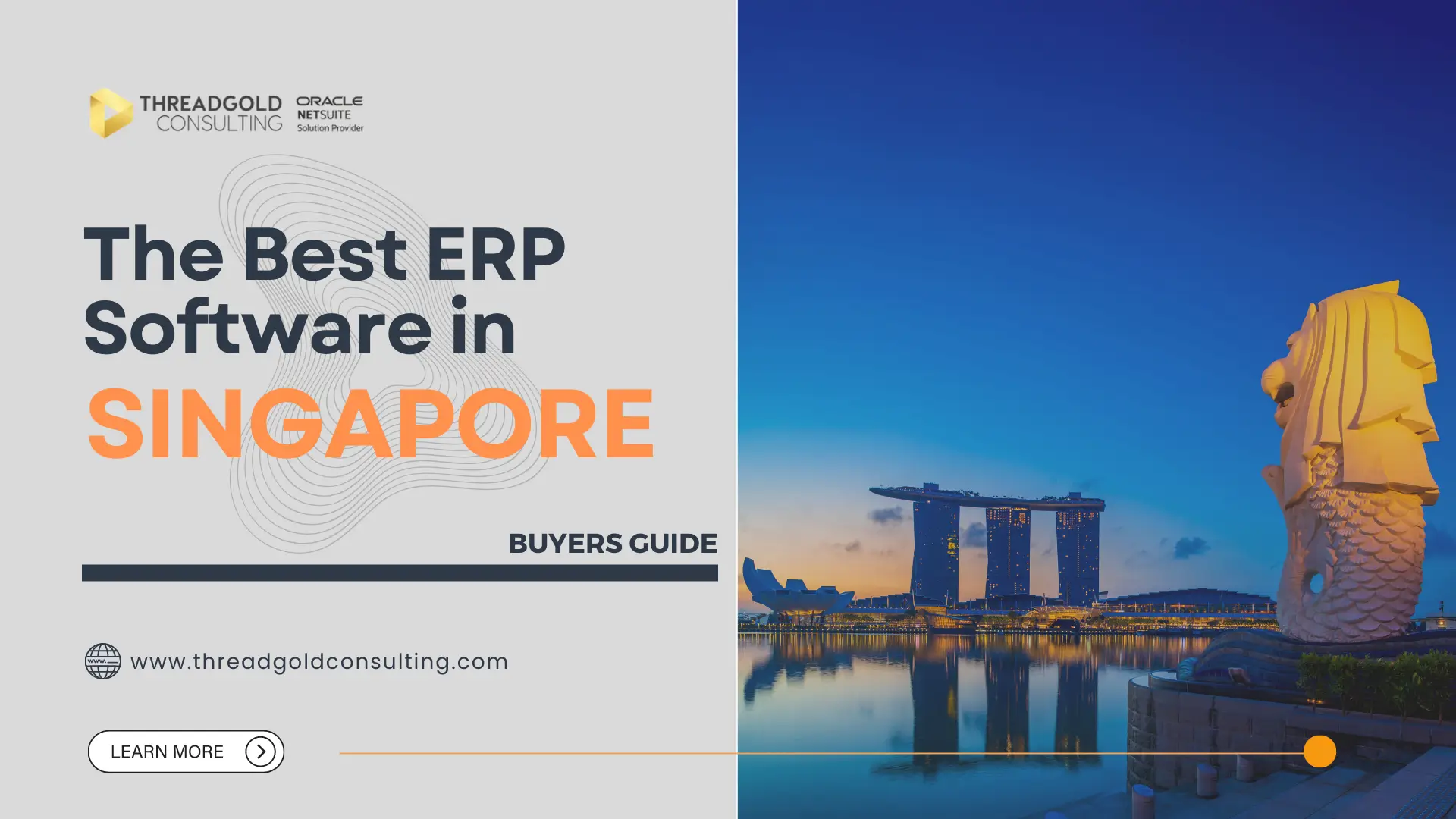



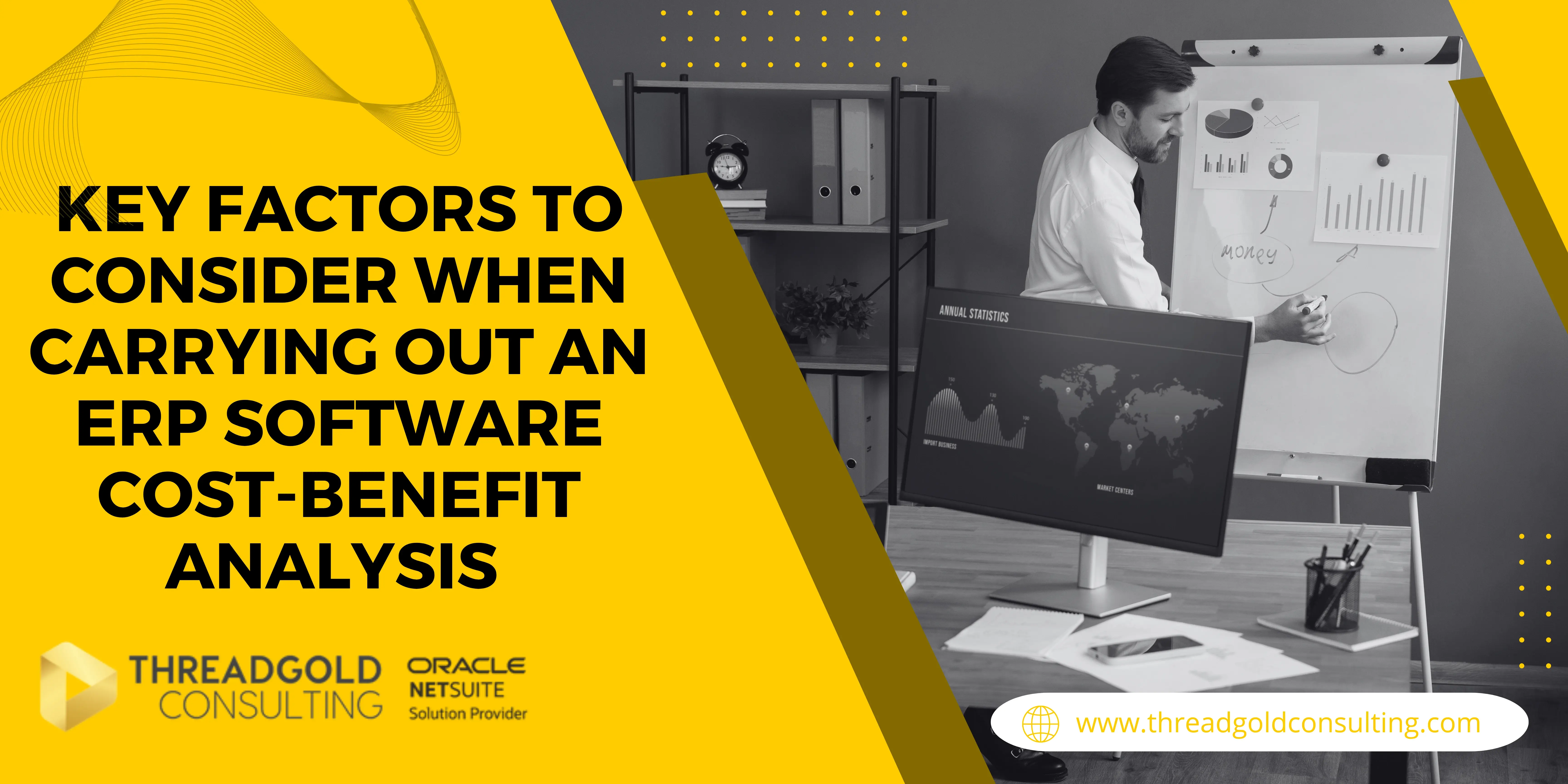
-2.png)
